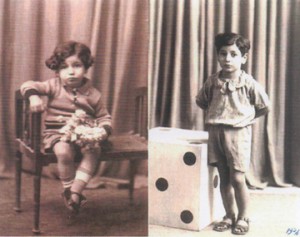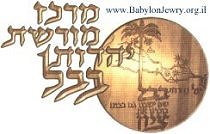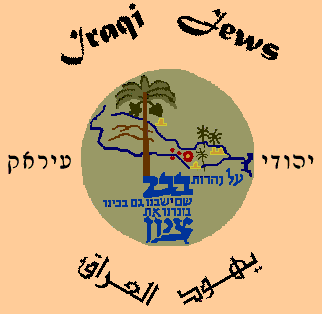Memoir of Baghdad recalls riches of a vanishing culture
JWeekly 8/12/2010
It has been nearly 60 years since Daniel Khazzoom left his native Baghdad — but the memories remain sharp and painful.
“The most painful part about writing [my memoir] was writing about Iraq,” Khazzoom said of the land where he spent the first 18 years of his life. “I did not want to remember it.”
Khazzoom, now 78, retired from U.C. Berkeley’s economics department in 2000 and spent the last eight years writing his just-published memoir, “No Way Back: The Journey of a Jew from Baghdad.”
The first half of the 256-page book focuses on his early life in Baghdad among the city’s 150,000 Jews, a childhood that began happily enough with six sisters and one brother.
BAkhazoom
Split photos of Daniel Khazzoom in 1934 (left) and 1936.
That easy way of life changed in 1941, when hundreds of Jews were killed and wounded in a violent two-day pogrom in the Iraqi capital. Although a boy at the time, as Khazzoom grew up he yearned to make aliyah, and finally left for the Jewish state in 1951.
The remainder of the book explores the six years he spent in Israel — which were unexpectedly isolating and disappointing. “In Iraq, I walked with a badge — I was Jewish,” Khazzoom said. “That determined the attitude toward us, which was often very hostile.
“I thought that if I went to Israel, I wouldn’t have to walk with a badge,” he said. “Regrettably, we walked with the badge that we were Arab. We spoke differently, we were less uptight about Jewish observance. [European Jews] didn’t know what to do with us. The easiest way was to call us inferior.
“In Israel, Arab was the enemy. So we became the enemy. And I resented it.”
Though Khazzoom was “disenchanted” by the treatment of Sephardic Jews, he nonetheless joined the Israel Defense Forces and enrolled at Tel Aviv University to study economics.
In 1957, he became the first Israeli college graduate accepted by a Harvard University graduate school. While earning his doctorate in economics, he found himself feeling more at home in the United States than Israel. Recalling this realization still makes him cry.
“I felt like I was being pulled in opposite directions,” he wrote. “On one hand, my experience in Israel as a Jew from an Arab land and my shattered dream of making Israel my homeland; on the other my sense of duty to settle in Israel at the end of my graduate work.
“For the first time in my life, no one seemed to hold my differences against me.”
That Khazzoom was uprooted from Baghdad and felt ostracized in Israel has stayed with him throughout his life. It inspired him to serve as a board member of the Bay Area organization JIMENA, Jews Indigenous to the Middle East and North Africa.
After Harvard, Khazzoom went on to teach and do groundbreaking research at McGill University in Quebec, Stanford University and U.C. Berkeley, where he spent the last 12 years of his academic career.
In the 1970s, while at McGill, he worked tirelessly to help save the land of a tribe of indigenous Indians in northern Quebec from the Canadian government, which wanted to displace the Indians for a major hydroelectric project.
The issue went to court, and in part due to Khazzoom’s economic research on energy theory that supported the indigenous population’s claim, the Superior Court of Quebec ruled against the government. Khazzoom was named an honorary member of the tribe in 1973.
When he retired, Khazzoom moved to Sacramento where he is involved in three synagogues: Reform, Conserv-ative and Orthodox. “I am Sephardic, and in the Sephardic world, there is no division,” he said. “So I go to all three, though most of time I go to the Conservative synagogue.”
With help from his wife, Mairin, and a journalist friend, Ellen Graham, Khazzoom finished and published his memoir. He presented it July 25 at the first New York Sephardic Jewish Book Fair, organized by the American Sephardi Federation.
He hopes it’s the first of many opportunities he will have to share his story with readers.
“I wanted to put it on record how we lived [in Iraq], because ours is a vanishing culture,” Khazzoom said. “If 100 years from now someone wants to know how we lived, it’s on record.”
Daniel Khazzoom will speak about his book at 2 p.m. Sunday, Aug. 22 at Mosaic Law Congregation, 2300 Sierra Blvd., Sacramento.




